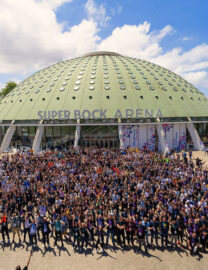This week: WordCamp Europe recap, WordPress 6.1 roadmap, Strattic in the hands of Elementor, and much more.
Guest editor: Ryan Sullivan

Ryan Sullivan runs SiteCare, a leading WordPress Maintenance and Digital Marketing company. He’s worked in the WordPress support and maintenance industry since 2012. He resides in the beautiful state of Utah with his wife and three sons. Ryan’s an advocate for people with autism, a questionable follow on Twitter, and loves the Utah Jazz.
WordPress celebrating its 19th birthday last week has had me thinking a lot about where WordPress is at in its software lifespan, and where it might be going next. I live every single day in the world of website and software maintenance, which means I probably look at WordPress in its current state differently than a lot of developers or end-users.
What if I told you that WordPress is just barely starting to hit its stride? I believe that. Does it have warts? Absolutely. Would I support a more rapid development cycle that leverages more modern frameworks and coding practices? Honestly? I’m not sure.
There’s something very charming and comforting about looking to mend and keep up a piece of software, as opposed to throwing it away in favor of the shiny and new. There’s certainly a balance that needs to be struck. Innovation can’t stop. And at the same time, I think we need to be very careful about hastily replacing something that has stood the test of time as well as WordPress has.
As residing Guest Author of the WP Owls newsletter (look at me wield this power), I’m going to challenge the readers to stop and appreciate WordPress for what it is today. Tomorrow we’ll go back to maintaining it, improving it, complaining about it, and imaging the next evolution.
Andy Henson does a great job describing the conflict between menders and makers in the developer community, and learning to strike a healthy balance between the two. WordPress can benefit greatly from this friction. Are you a maker or a mender?
“We should probably have our best developers doing software maintenance,” argues Jeff Atwood, creator of StackOverflow. Is that true in your organization?
“There’s a subtle reason that programmers always want to throw away the code and start over. […] The reason that they think the old code is a mess is because of a cardinal, fundamental law of programming: It’s harder to read code than to write it.” Is your first impulse to throw code away?

Elementor has taken over Strattic. At first glance, it seems to be a fairly strange transaction, however, given Elementor’s recent moves concerning hosting, the ability to convert your site into a static one will make them stand out.

rtCamp has launched WP Plugin Compare, a service that allows comparing different plugins available in the repository.

GoDaddy’s coverage recaps WordCamp Europe and their photos make me pine for the next year’s edition.
Atarim version 3.0 has lots of new functions. Its most crucial quality is probably that it works with non-WordPress websites.
Rodolfo Melogli explains what he thinks WooCommerce is missing the most. It’s hard to disagree with him.
WordCamp Warsaw took place at the weekend. The recording is available on Youtube.

Based on his workshop at WordCamp Europe 2022, Maciek Palmowski wrote an article on deployment automation.
Deploying WordPress with confidence using CI/CDLeonardo Losoviz shares what he learned from presentations at WordCamp Europe.
David Bisset has summed up the highlights of WordCamp Europe.
Stalkfish is a new service that allows you to monitor the accessibility of WordPress-based websites. Its alerts function works especially well.
Matias Ventura has published a roadmap to WordPress 6.1. Of course, most of the changes will involve Gutenberg, patterns, and FSE.
Igor Benic has prepared a report of tweets related to WordCamp Europe.
Laura Byrne explains what we should pay attention to when choosing an LMS.
At WordCamp Europe, Nathan Wrigley ran several interviews with people from the WordPress world. The first episode of this mini-series is an interview with Remkus de Vries on the beginnings of this event.
Eric Karkovack explains what to consider when choosing the right plugin with blocks.
Do you still remember the Atom editor created in 2014? Well, its tenure is coming to an end. The developers considered further development pointless taking into account the popularity of Visual Studio Code.
